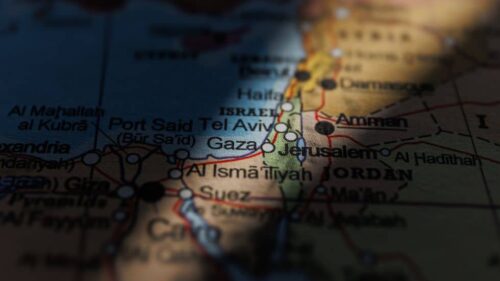The call for a two-state solution in Yemen is not a call for division. Instead, it is a call for realism, which can restore hope, finally bring peace to a fractured land and stability to a volatile region. The recent introduction of a 50-riyal coin by the Houthis in North Yemen is a lot more than just an economic maneuver: it is an unmistakable step towards a full-fledged financial secession and the consolidation of de facto statehood.
It represents yet another violation of the fragile notion of national unity, as the Houthis tighten their grip over economic institutions, expand their separate legal frameworks and undermine any prospects for a unified peace. Far from acting as partners in reconciliation, the Houthis are the belligerents intent on cementing their state, with regional and international implications that extend well beyond Yemen’s borders.
The Houthis have not only rejected any future southern state — they have openly declared their ambitions to rule over the entire Yemeni state. Their refusal to consider federalism or any form of a two-state solution further endangers peace and regional stability.
Their ambition for total control, coupled with a hard-line theocratic ideology, akin to that of the Taliban in Afghanistan, will only fuel further extremism and drive Yemen deeper into sectarian conflict. Nadwa Dawsari, an associate fellow at the Washington-based Middle East Institute, warned: “The Houthis are not just another armed group—they are an ideologically driven militia that sees compromise as defeat. Their goal is total domination, not peace.”
Grave human rights abuses undermine peace prospects
This uncompromising stance accompanies grave human rights abuses. The Houthis have systematically recruited thousands of children to fight in their war, indoctrinating them in militant ideology and sending them to the frontlines. A 2022 United Nations Panel of Experts report documented nearly 1,500 children recruited in a single year. Human Rights Watch condemned this practice, noting, “The Houthis have turned schools into recruitment centers robbing boys of their childhoods and forcing them to fight in a war they neither started nor understand.”
Further, the Houthis have targeted international aid workers and institutions. In 2021, 2023, 2024 and at the beginning of this year, they detained multiple staff members from the United Nations and non-governmental organizations (NGOs) on baseless espionage charges, drawing international condemnation. They have yet to release these detainees.
On June 2 of this year, UN Secretary-General António Guterres called for their “immediate and unconditional release,” emphasizing that these arrests jeopardize vital humanitarian efforts in a country where 70% of the population depends on aid. Former UN Special Envoy to Yemen Martin Griffiths called the arbitrary detention of aid workers a “flagrant violation of international law and a direct threat to humanitarian principles.”
These violations illustrate why the Houthis cannot be considered legitimate peace partners. Their expansionist agenda, systemic human rights abuses, and rejection of pluralism make them fundamentally incompatible with one democratic, inclusive Yemeni state.
Unified Yemen is no longer a realistic goal
This hard reality forces the international community to confront what many have long avoided: a unified Yemen under a single central government is no longer a tenable goal. Sadly, the UK government continues to refer to the Internationally Recognized Government (IRG) as the sole political institution with which it can conduct business.
Dreaming about a united Yemen is a fata morgana (mirage). A sustainable peace lies in embracing the realities on the ground. Most notably, the existence of a functioning, organized southern movement led by the Southern Transitional Council (STC), which controls significant territory and commands broad public support.
The STC has demonstrated administrative and security capabilities and has consistently expressed its readiness to cooperate internationally to build a viable southern state. However, the inability to export oil — as the Houthis are targeting oil tankers leaving southern ports — is suffocating the STC.
In May this year, the IRG announced economic losses amounting to $7.5 billion since the cessation of oil and gas exports in October 2022, due to the Houthis targeting oil installations, which have affected 90% of exports and 80% of the general budget revenues.
Yemen’s Permanent Representative to the United Nations, Ambassador Abdullah Al-Saadi, blamed the Houthis for deepening the humanitarian crisis and the collapse of the national currency, which disrupted the payment of salaries and the funding of basic services.
STC President Aidarous Al-Zubaidi has been a vocal advocate for southern independence on the world stage. In his June 23, 2023, interview with The Guardian, Al-Zubaidi underscored the “deep and enduring desire of the southern Yemeni people to reclaim their sovereignty” and called on the international community to recognize the irreversible realities on the ground.
He lamented that decades of neglect and political marginalization have driven southerners to seek independence as the only viable path to peace and prosperity. Al-Zubaidi emphasized that the south is not just seeking to break away but to build a stable, democratic and economically thriving state that can be a partner in regional and international security.
Southern leaders outline a vision for independence
Supporting this vision, Nasser Alkubaggi, a prominent STC figure, has articulated a clear and pragmatic vision for a two-state solution. In discussions with the German-based Friedrich-Ebert-Stiftung (FES) — the oldest political foundation in Germany, which promotes the core ideas and values of social democracy — Alkubaggi stressed the importance of economic development and capacity-building in the south as an essential component for sustainable peace.
He argued that without empowering southern institutions and creating economic opportunities, no political solution can succeed. Alkubaggi envisions a southern state that leverages its rich resources, strategic ports and entrepreneurial population to become a beacon of development and stability in the region, serving as a counterbalance to the turmoil in the north.
Dr. Abdul Galil Shaif, STC representative in Geneva and author of the book South Yemen: Gateway to the World, substantiates the case for southern autonomy and eventual independence in his work. Shaif’s detailed research highlights the political and economic viability of an independent South Yemen. He writes, “A Southern Yemeni state could offer a real alternative to the corrupt and failed structures of the past. It could build a competent and transparent government focused on economic stability and development.”
Shaif further argues that Aden, with international support, could become a regional commercial hub, on par with the United Arab Emirates (UAE), modernizing its port infrastructure and restoring its global partnerships.
International reluctance blocks the path to conflict resolution
Many analysts see international reluctance to acknowledge southern aspirations as a key obstacle to ending the devastating conflict that began in 2014, when the capital, Sanaa, already destabilized by the Arab Spring uprising that began in 2011, was overtaken by the Houthis.
Michael Rubin, senior fellow at the American Enterprise Institute, highlights the strategic importance of recognizing the South’s legitimate ambitions. “Given its long history of accepting the dissolution of unhappy unions, the United States’s refusal today to recognize South Yemen is an anomaly,” Rubin notes. He argues that a Southern Yemeni state would serve as a stabilizing force — securing critical maritime routes like Bab el-Mandab, countering Houthi expansion and Iranian influence, and aligning strategically with Gulf and Western interests.
The international community does not need to immediately grant full diplomatic recognition for a southern state to function effectively. Comparable models — such as Somaliland and Iraqi Kurdistan — demonstrate that significant political autonomy and institutional development can occur without full international recognition.
Somaliland has operated with near-complete sovereignty since 1991, maintaining its government, currency, elections and legal system, despite remaining formally part of Somalia. Similarly, the Kurdistan Regional Government (KRG) controls its security forces and foreign relations within Iraq’s federal framework. Such examples offer a pragmatic path forward for Yemen.
Phased sovereignty, where autonomy precedes full recognition, can allow the south to build institutions, foster stability and attract investment, especially in the fishing and tourism sectors. It also provides time for the international community to adjust to the new reality of an independent southern state.
A two-state solution as the only path to stability
In stark contrast, the Houthis’s vision threatens to plunge Yemen — and the broader region — into deeper conflict and chaos. Their outright rejection of a southern state and their expansionist ambitions, combined with egregious human rights violations, including child soldier recruitment and imprisonment of humanitarian workers, exacerbate instability, as do their continued attacks on Israel and shipping in the Red Sea.
The stakes could not be higher. Yemen’s future depends on pragmatic recognition of the two-state reality on the ground. To continue ignoring this will only deepen the suffering of millions, prolong the war and create a fertile ground for extremism that imperils the entire region and beyond.
Yemen can only achieve a durable peace by acknowledging the legitimate aspirations of the south, empowering its institutions and negotiating a political settlement based on mutual recognition. The international community must abandon outdated policies and embrace a new paradigm — one that fosters a viable southern state as a partner for peace, development and regional security.
[South24 first published a version of this piece.]
[Kaitlyn Diana edited this piece.]
The views expressed in this article are the author’s own and do not necessarily reflect Fair Observer’s editorial policy.
Support Fair Observer
We rely on your support for our independence, diversity and quality.
For more than 10 years, Fair Observer has been free, fair and independent. No billionaire owns us, no advertisers control us. We are a reader-supported nonprofit. Unlike many other publications, we keep our content free for readers regardless of where they live or whether they can afford to pay. We have no paywalls and no ads.
In the post-truth era of fake news, echo chambers and filter bubbles, we publish a plurality of perspectives from around the world. Anyone can publish with us, but everyone goes through a rigorous editorial process. So, you get fact-checked, well-reasoned content instead of noise.
We publish 3,000+ voices from 90+ countries. We also conduct education and training programs
on subjects ranging from digital media and journalism to writing and critical thinking. This
doesn’t come cheap. Servers, editors, trainers and web developers cost
money.
Please consider supporting us on a regular basis as a recurring donor or a
sustaining member.
Will you support FO’s journalism?
We rely on your support for our independence, diversity and quality.









Comment